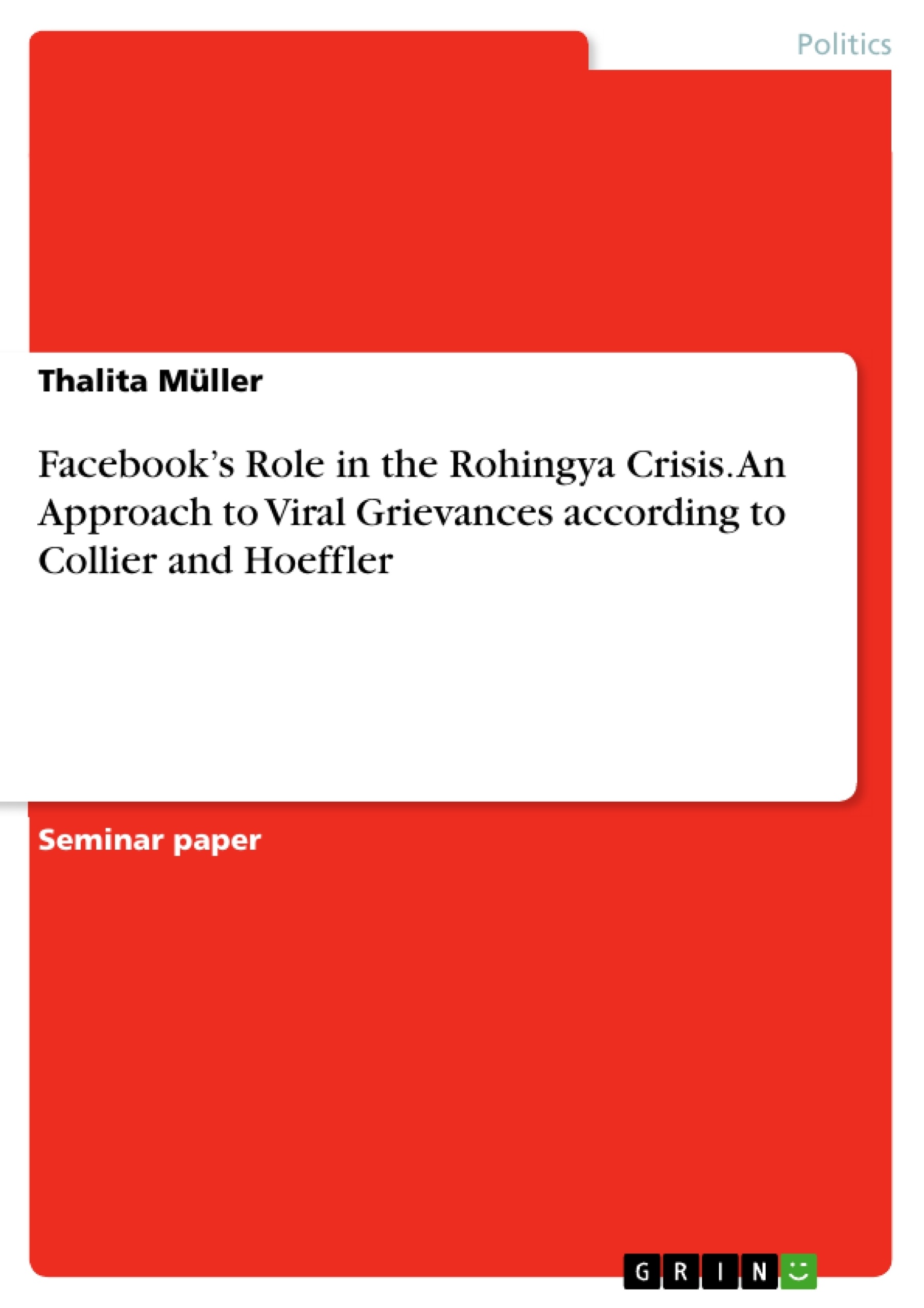This paper investigates Facebook’s role in the Rohingya crisis. The term Rohingya is widely used to name the Muslim ethnic minority in Rakhine (also known as Arakan) State, Myanmar. Myanmar, with its prevalently Buddhist population, systematically oppressed the group (for example Rohingyas are denied citizenships, which makes it impossible for the Rohingyas to enjoy the state’s welfare system, etc.).
In respond to this maltreatment, the Arakan Rohingya Salvation Army (ARSA) attacked several police stations in the Rakhine state in 2017. Myanmar’s armed forces retaliated with atrocities against the Rohingya Muslim minority so fiercely and brutally, that even the extra funded UN Independent International Fact-Finding Mission on Myanmar (IIFFMM) reasoned that there was genocidal interest in Myanmar’s so-called anti-terrorist actions. In 2019, more than 900,000 Rohingya refugees were counted in the neighboring Bangladesh. The genocide and other mass atrocities are still on-going.
Inhaltsverzeichnis (Table of Contents)
- Facebook's role in the Rohingya Conflict
- An approach to viral ‘Grievances’
- The 'Grievance' Thesis by Collier and Hoeffler
- 'Grievances' of Buddhist Nationalists towards Rohingyas (via Facebook)
- Subsumption of the ‘Grievance Model' to the case of Myanmar
- Conclusion and recommended course of action
Zielsetzung und Themenschwerpunkte (Objectives and Key Themes)
This paper examines the role of Facebook in the Rohingya crisis in Myanmar, focusing specifically on how the platform has been used to spread hate speech and misinformation, contributing to violence and persecution against the Rohingya Muslim minority.
- The role of Facebook in the Rohingya crisis
- The ‘Grievance’ Thesis by Collier and Hoeffler
- The spread of hate speech against Rohingyas through Facebook posts
- The role of ultranationalist groups and the Burmese government in spreading hate speech
- The impact of Facebook on inter-religious tensions and violence in Myanmar
Zusammenfassung der Kapitel (Chapter Summaries)
- The first chapter provides an overview of the Rohingya crisis and the role of Facebook in exacerbating tensions and violence against the Rohingya Muslim minority. It details the lawsuit filed against Meta Platforms Inc. (formerly Facebook) by Rohingya refugees, highlighting the platform’s failure to contain anti-Rohingya hate speech, leading to misinformation and increased violence.
- The second chapter explores the ‘Grievance’ Thesis by Collier and Hoeffler, examining the three motivations for grievance-driven rebellions: inter-group hatred, political exclusion, and vengeance. It analyzes the applicability of this model to the Rohingya conflict and explores the concept of grievance as a social construct.
- The third chapter focuses on the ‘Grievances’ of Buddhist Nationalists towards Rohingyas, specifically examining the role of Facebook in spreading hate speech and misinformation by ultranationalist groups like MaBaTha. It highlights the role of hate speech in inflaming inter-religious tensions and the impact of social media on the Rohingya crisis.
Schlüsselwörter (Keywords)
This paper centers on key themes such as the Rohingya crisis, Facebook, hate speech, misinformation, inter-religious tensions, ultranationalism, and the ‘Grievance’ Thesis by Collier and Hoeffler. It explores the impact of social media on conflict and examines the responsibility of social media platforms in combating hate speech and ensuring online safety.
Frequently Asked Questions
What role did Facebook play in the Rohingya crisis?
Facebook was used as a platform to spread hate speech, misinformation, and viral grievances, which exacerbated inter-religious tensions and contributed to violence against the Rohingya minority.
What is the ‘Grievance’ Thesis by Collier and Hoeffler?
The thesis identifies three main motivations for grievance-driven conflict: inter-group hatred, political exclusion, and vengeance.
How did Buddhist Nationalists use social media in Myanmar?
Ultranationalist groups like MaBaTha used Facebook to post anti-Muslim content, portraying the Rohingya as a threat to the Buddhist population and the state.
Is there legal action against Facebook regarding this crisis?
Yes, the paper mentions lawsuits filed by Rohingya refugees against Meta Platforms Inc. for failing to contain hate speech that led to real-world atrocities.
What are the consequences of the crisis for the Rohingya population?
The crisis resulted in genocidal violence, systematic oppression, and the displacement of over 900,000 refugees to neighboring Bangladesh.
- Citation du texte
- Thalita Müller (Auteur), 2022, Facebook’s Role in the Rohingya Crisis. An Approach to Viral Grievances according to Collier and Hoeffler, Munich, GRIN Verlag, https://www.grin.com/document/1316020



